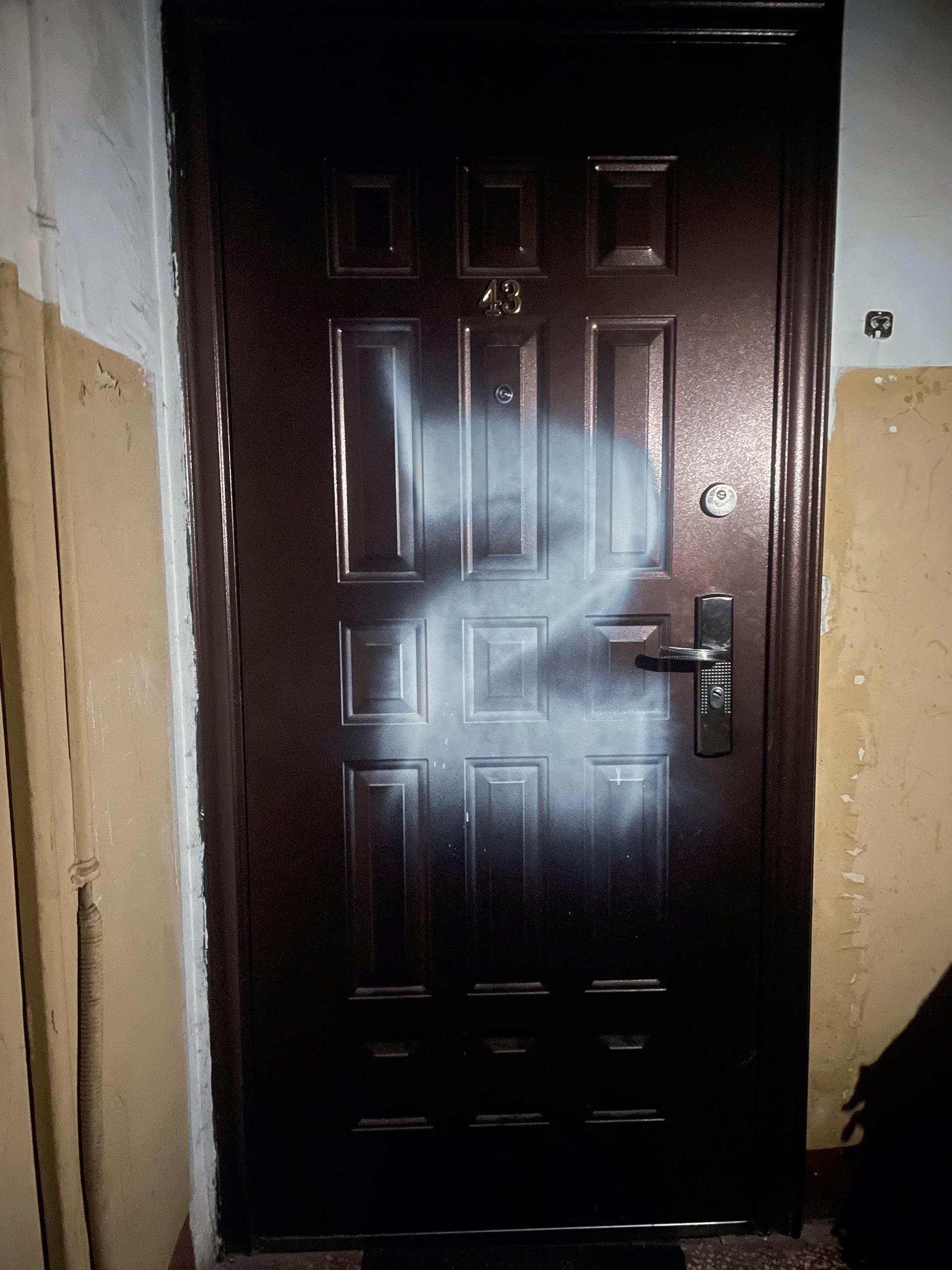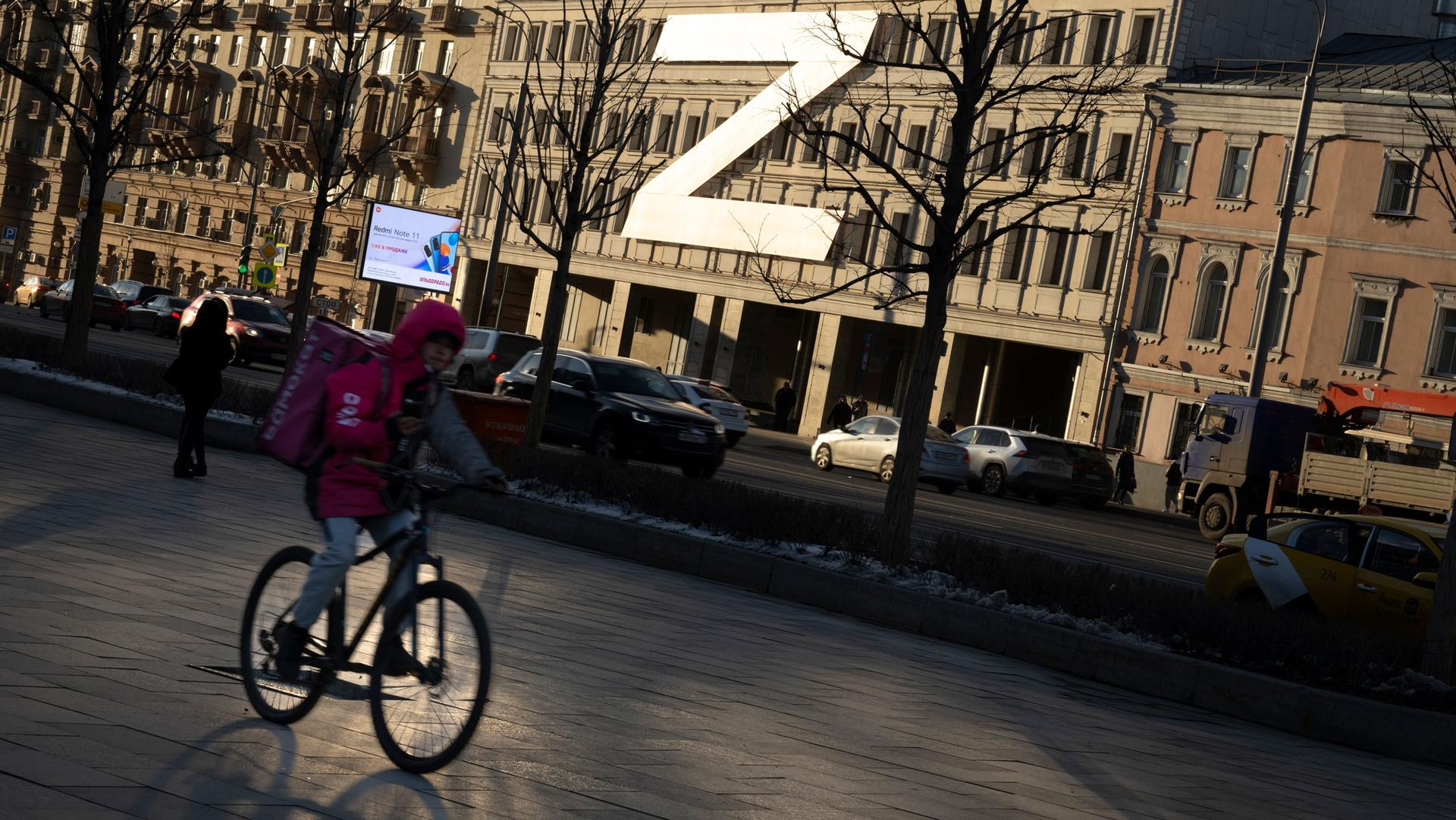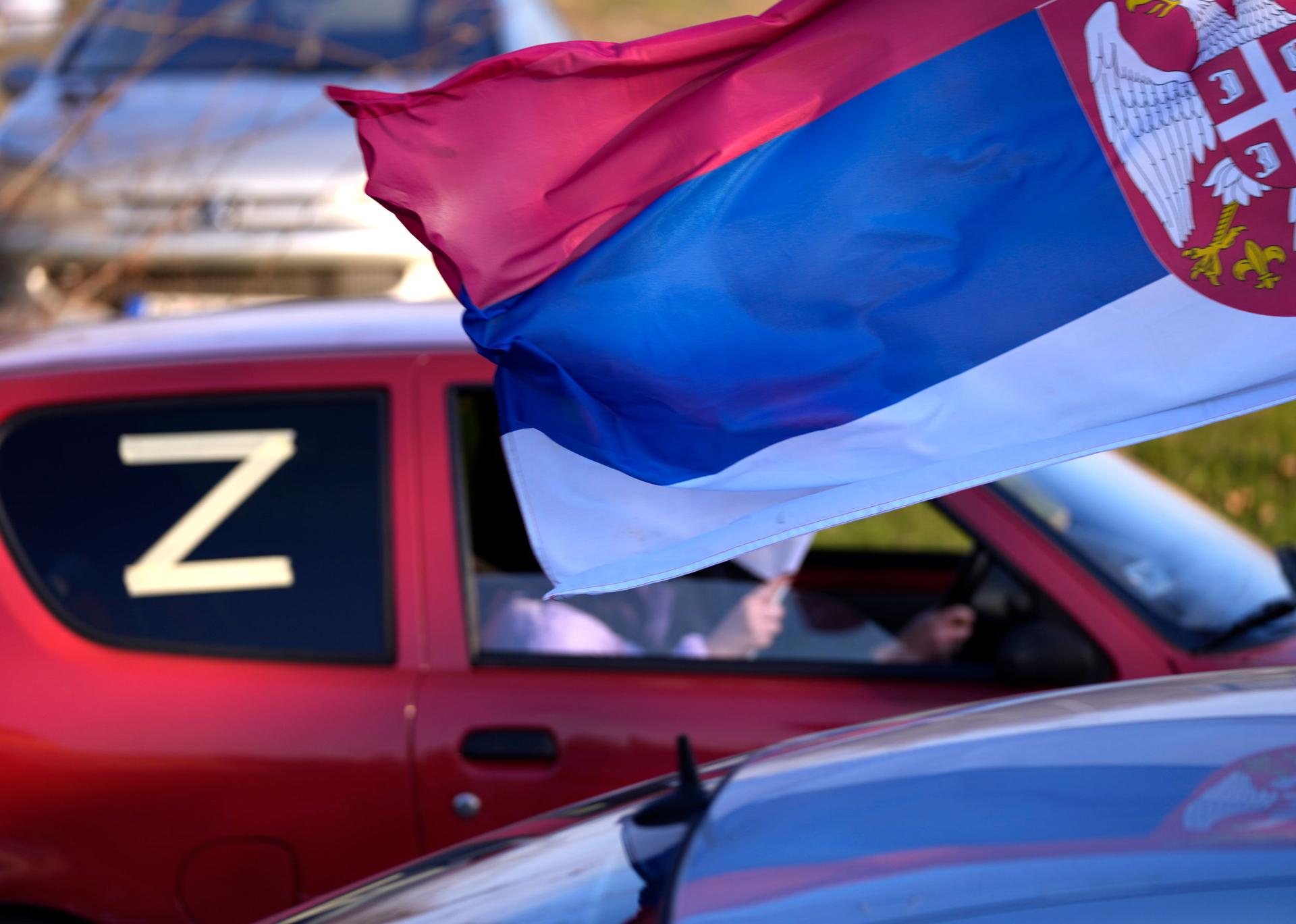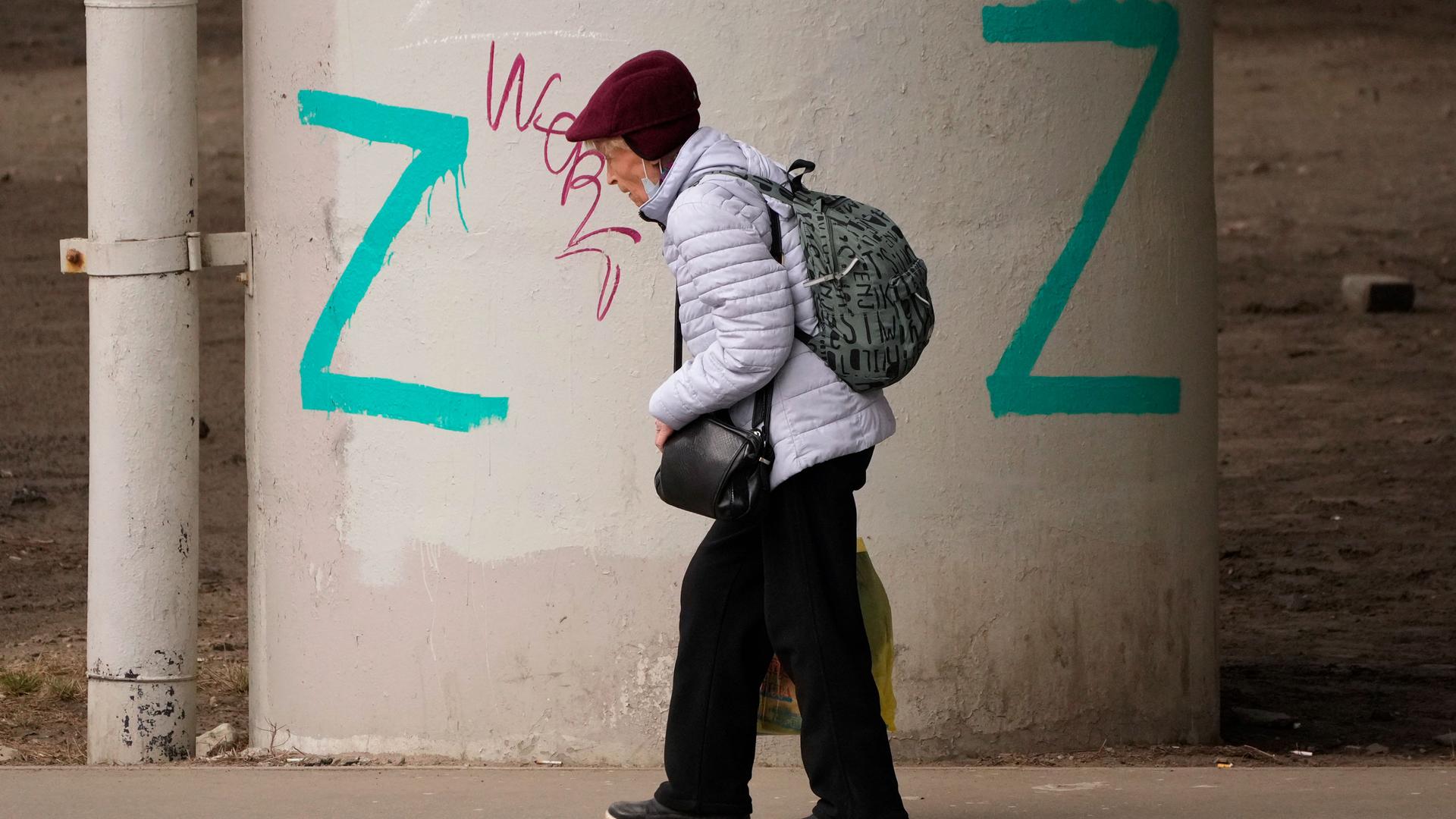When Anton Dolin, a well-known film critic in Russia, opened the front door of his Moscow apartment on March 6, he found the letter Z in spray paint across the door.
Dolin said he does not consider himself a political activist. But after Russia invaded Ukraine on Feb. 24, Dolin became more outspoken in his criticism of the regime, posting comments on his Facebook page condemning the war.
He knew that this was a warning from supporters of Russian President Vladimir Putin, telling him he was being watched.
“They wanted to show us that they know where we live. They know who we are. They know what we think about the war.”
“They wanted to show us that they know where we live. They know who we are. They know what we think about the war,” he said.

The letter Z has become a symbol of support in Russia and around the world for the country’s attack on Ukraine. Now, European countries like Lithuania and Latvia are moving to ban the letter as one step toward stemming Russia’s pro-war propaganda.
Since early March, the letter Z has appeared on advertising billboards and on the sides of buildings in St. Petersburg and other cities.
A Russian TV presenter wore a T-shirt with the Z symbol on the front on a popular political talk show. The state TV channel RT refers to the war in Ukraine as “Special Operation Z,” and Russian riot police have been seen with the letter taped to their helmets.
In March, Russian athlete Ivan Kuliak appeared at the Gymnastics World Cup in Doha with a letter Z taped to his chest as he accepted his bronze medal. Standing next to him was gold medalist Illia Kovtun from Ukraine.
Related: ‘I know that he will not stop fighting,’ wife of Kremlin critic Vladimir Kara-Murza says
What does Z mean?
No one is exactly sure of the symbol’s original meaning.
Military experts first noticed it painted on the sides of Russian tanks and armored vehicles as they amassed on the Ukrainian border in early February.
Russian media analyst Vasily Gatov, a senior fellow at the USC Annenberg Center on Communication, Leadership and Policy, said the most popular theory is that it represents where the troops and their tanks are usually stationed in Russia.
“Z means zapad or ‘west,’ referring to the western military district. O means central. And V refers to eastern military districts.”
“Z means zapad or ‘west,’ referring to the western military district. O means central. And V refers to eastern military districts,” Gatov said.
Russia’s Defense Ministry has since put up an Instagram post claiming that Z refers to za pobedu, meaning “for victory,” in Russian.
He pointed out that the way the letter Z is written by pro-war activists today is also similar to how it was drawn in “Zorro” comics. The fictional character of Zorro is an avenging vigilante who fights to protect the common people. The comic was extremely popular in Russia when it was first released there in the 1960s, Gatov said.

Fleeing Z
The day Dolin discovered the letter Z painted on his door was also his last day in Moscow.
Two days earlier, Russia’s parliament had passed a law threatening to sentence anyone found spreading “false news” about the Russian military to up to 15 years in prison. The ruling was seen as a way to silence anti-war protesters in Russia.
Dolin had hosted a video on YouTube featuring Russian filmmakers speaking out against attacks on Ukraine. At a film event in Samara, in southern Russia, Dolin also gave a speech denouncing the invasion.
Dolin said he knew then that he would have to leave his home country with his family.
“We never decided that we will leave Russia forever. But it was clear that during this period of war, it’s not safe for us,” Dolin said.
There was also a rumor that Putin was planning to announce a full military mobilization, meaning that Dolin and his 19-year-old son could be forced to join the Russian army and go to war. Dolin said the idea was simply unthinkable.
Today, the Russian film critic lives with his family just outside Riga, the Latvian capital.
Stemming Russian propaganda in Europe
Last month, the Latvian parliament voted to ban public displays of the letter Z, saying it is a symbol that is being used to glorify the Russian invasion of Ukraine.
Dolin welcomes the gesture but is not sure it will have much effect.
“I don’t think it can really help politically. It’s just another way of showing that all of this war is criminal. But can prohibiting the letter help in any way? Maybe, but I’m not really sure.”
Related: Are sanctions against Russia working? An expert weighs in.
The letter Z has now started to pop up in Lithuania too, spray-painted on doors and on the sides of cars, according to Lithuanian Member of Parliament Monika Ošmianskienė.
Ošmianskienė tabled a motion in parliament in Vilnius last week that called for public displays of the letters Z and V to be outlawed along with other symbols that show support for Russia’s invasion in Ukraine.
The motion passed with one objection and two abstentions.
Related: As the war rages in Ukraine, Radio Sputnik occupies the airwaves in American heartland
Lithuania, which spent half of the 20th century under Soviet rule, shares part of its border with Russia.
Ošmianskienė said some citizens are nervous that Russia could turn its focus on Lithuania next. But she said that her main concern is the spread of disinformation, and she hopes that the ban will stave off pro-war propaganda.
Gatov said the use of the letter Z is also a reminder of how the swastika, a holy symbol in Hinduism, Jainism and Buddhism for centuries, was adopted by Adolf Hitler as his party’s emblem in Germany in 1920.

A few weeks ago, Dolin’s elderly father died suddenly in Russia.
Dolin didn’t attend the funeral because he was afraid that he would be arrested if he returned. The film critic said he believes the war killed his father, not literally, but emotionally.
“I think this war actually killed him. Not in a direct way, but I think he couldn’t support what was going on,” he said, adding that his father was devastated to see what his country was doing to Ukraine.
Dolin said he doesn’t know when or if he’ll ever be able to return to Russia.
